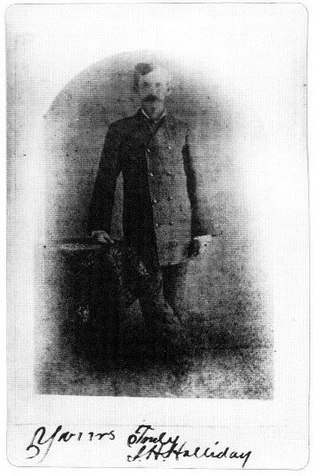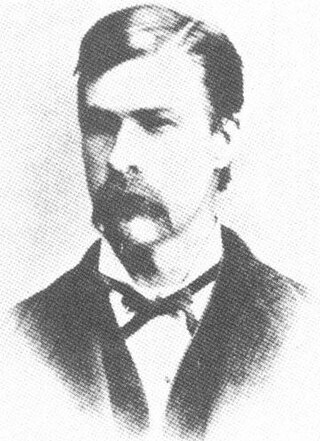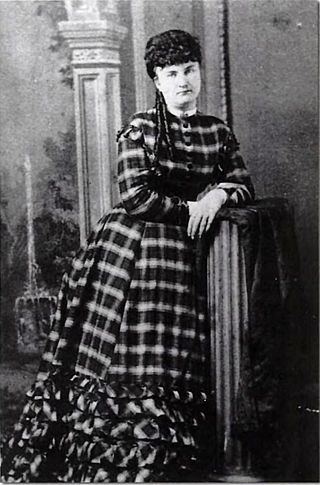
The gunfight at the O.K. Corral pitted lawmen against members of a loosely organized group of cattle rustlers and horse thieves called the Cowboys on October 26, 1881. While lasting less than a minute, the gunfight has been the subject of books and films into the 21st century. Taking place in the town of Tombstone in Arizona Territory, the battle has become one archetype of the American Old West. The gunfight was the result of a long-simmering feud between five outlaws and four representatives of the law, including three brothers. The trigger for the event was the local marshal's decision to enforce a city ordinance that prohibited the carrying of weapons into town. To enforce that ordinance, the lawmen would have to disarm the Cowboys.

John HenryHolliday, better known as Doc Holliday, was an American dentist, gambler, and gunfighter who was a close friend and associate of lawman Wyatt Earp. Holliday is best known for his role in the events surrounding and his participation in the gunfight at the O.K. Corral in Tombstone, Arizona. He developed a reputation as having killed more than a dozen men in various altercations, but modern researchers have concluded that, contrary to popular myth-making, Holliday killed only one to three men. Holliday's colorful life and character have been depicted in many books and portrayed by well-known actors in numerous movies and television series.

Wyatt Berry Stapp Earp was an American lawman in the American West, including Dodge City, Deadwood, and Tombstone. Earp was involved in the gunfight at the O.K. Corral, during which lawmen killed three outlaw Cochise County Cowboys. While Wyatt is often depicted as the key figure in the shootout, his brother Virgil was both Deputy U.S. Marshal and Tombstone City Marshal that day and had considerably more experience in law enforcement as a sheriff, constable, and marshal than did Wyatt. Virgil made the decision to enforce a city ordinance prohibiting carrying weapons in town and to disarm the Cowboys. Wyatt was only a temporary assistant marshal to his brother.

Virgil Walter Earp was an American lawman. He was both deputy U.S. Marshal and City Marshal of Tombstone, Arizona, when he led his younger brothers Wyatt and Morgan, and Doc Holliday, in a confrontation with outlaw Cowboys at the Gunfight at the O.K. Corral on October 26, 1881. They killed brothers Tom and Frank McLaury and Billy Clanton. All three Earp brothers had been the target of repeated death threats made by the Cowboys who were upset by the Earps' interference in their illegal activities. All four lawmen were charged with murder by Ike Clanton, who had run from the gunfight. During a month-long preliminary hearing, Judge Wells Spicer exonerated the men, concluding they had been performing their duty.

Morgan Seth Earp was an American sheriff and lawman. He served as Tombstone, Arizona's Special Policeman when he helped his brothers Virgil and Wyatt, as well as Doc Holliday, confront the outlaw Cochise County Cowboys in the gunfight at the O.K. Corral on October 26, 1881. All three Earp brothers had been the target of repeated death threats made by the Cowboys who were upset by the Earps' interference in their illegal activities. The lawmen killed Cowboys Tom and Frank McLaury and Billy Clanton. All four lawmen were charged with murder by Billy's older brother, Ike Clanton, who had run from the gunfight. During a month-long preliminary hearing, Judge Wells Spicer exonerated the men, concluding they had been performing their duty.

Wyatt Earp is a 1994 American epic biographical Western drama film directed and produced by Lawrence Kasdan, and co-written by Kasdan and Dan Gordon. The film covers the lawman of the same name's life, from an Iowa farmboy, to a feared marshal, to the feud in Tombstone, Arizona that led to the O.K. Corral gunfight. Starring Kevin Costner in the title role, it features an ensemble supporting cast that includes Gene Hackman, Mark Harmon, Michael Madsen, Bill Pullman, Dennis Quaid, Isabella Rossellini, Tom Sizemore, JoBeth Williams, Mare Winningham and Jim Caviezel in one of his earliest roles.
Mary Katherine Horony Cummings, popularly known as Big Nose Kate, was a Hungarian-born American outlaw, gambler, prostitute and longtime companion and common-law wife of Old West gambler and gunfighter Doc Holliday. "Tough, stubborn and fearless", she was educated, but chose to work as a prostitute due to the independence it provided her. She is the only woman with whom Holliday is known to have had a relationship.

The Earp Vendetta Ride was a deadly search by a federal posse led by Deputy U.S. Marshal Wyatt Earp for a loose confederation of outlaw "Cowboys" they believed had ambushed his brothers Virgil and Morgan Earp, maiming the former and killing the latter. The two Earp brothers had been attacked in retaliation for the deaths of three Cowboys in the Gunfight at the O.K. Corral on October 26, 1881. From March 20 to April 15, 1882, the federal posse searched southeast Cochise County, Arizona Territory for the men they believed were responsible for the attacks on Virgil and Morgan. Several suspects had been identified and were charged, but were soon released by the court, owing in some cases to legal technicalities and in others to the strength of alibis provided by the Cowboy gang. Wyatt subsequently pursued the suspects with a federal warrant.
John "Turkey Creek Jack" Johnson was an American bookkeeper, lawyer, cattle handler and lawman. He rode with Wyatt Earp as a member of the posse during the Earp Vendetta Ride.

James Cooksey Earp was a lesser known older brother of Old West lawman Virgil Earp and lawman/gambler Wyatt Earp. Unlike his brothers, he was a saloon-keeper and was not present at the Gunfight at the O.K. Corral on October 26, 1881.

WarrenBaxterEarp was an American frontiersman and lawman. He was the youngest of Earp brothers, Wyatt, Morgan, Virgil, James, and Newton Earp. Although he was not present during the Gunfight at the O.K. Corral, after Virgil was maimed in an ambush, Warren joined Wyatt and was in town when Morgan was assassinated. He also helped Wyatt in the hunt for the outlaws they believed responsible. Later in life, Warren developed a reputation as a bully and was killed in an argument in 1900.

Celia Ann "Mattie" Blaylock was a prostitute who became the romantic companion and common-law wife of Old West lawman and gambler Wyatt Earp for about six years. Knowledge of her place in Wyatt's life was concealed by Josephine Earp, his later common-law wife, who worked ceaselessly to protect her and Wyatt's reputation in their later years. Blaylock's relationship with Earp was rediscovered by Earp researcher John Gilchriese and author Frank Waters in the 1950s, when they uncovered a coroner's report for "Mattie Earp", and a deathbed conversation in which she told someone, "Wyatt Earp had ruined my life."

Frank C. Stilwell was an outlaw Cowboy who killed at least two men in Cochise County during 1877–82. Both killings were considered to have been self-defense. For four months he was a deputy sheriff in Tombstone, Arizona Territory for Cochise County Sheriff Johnny Behan. Stilwell owned interests in several mines and various businesses, including a saloon, a wholesale liquor business, a stage line, and at his death livery stables in Charleston and Bisbee. He was also a partner in a Bisbee-area saloon with ex-Texas Ranger Pete Spence.

Thomas Fitch was an American lawyer and politician. He defended President Brigham Young of the Church of Jesus Christ of Latter-day Saints and other church leaders when Young and his denomination were prosecuted for polygamy in 1871 and 1872. He also successfully defended Virgil, Morgan, and Wyatt Earp along with Doc Holliday when they were accused of murdering Billy Clanton, and Tom and Frank McLaury during the October 26, 1881 Gunfight at the O.K. Corral.

Nicholas Porter Earp was the father of well-known Western lawmen Virgil, Wyatt, and Morgan, and their lesser-known brothers James, Newton and Warren Earp. He was a justice of the peace, a farmer, cooper, constable, bootlegger, wagon-master, and teacher.
Phineas Fay Clanton was the son of Newman Haynes Clanton and the brother of Billy and Ike Clanton. He was witness to and possibly played a part in a number of illegal activities during his life. He moved frequently in his early life from Missouri to California and to Arizona.
Frederick J. Dodge was an undercover Wells Fargo detective, a constable in Tombstone, Arizona, and a Texas cattleman. He was born in Spring Valley in northern Butte County, California and was raised in Sacramento.
Ben Sippy was City Marshal of Tombstone, Arizona Territory, from November 12, 1880, to June 6, 1881. He beat out Deputy U.S. Marshal Virgil Earp for the office but left under a cloud of financial impropriety.

The O.K. Corral hearing and aftermath was the direct result of the 30-second Gunfight at the O.K. Corral in Tombstone, Arizona Territory, on October 26, 1881. During that confrontation, Deputy U.S. Marshal and Tombstone Town Marshal Virgil Earp, Assistant Town Marshal Morgan Earp, and temporary deputy marshals Wyatt Earp and Doc Holliday shot and killed Billy Clanton, and Tom and Frank McLaury. Billy's brother Ike, who had repeatedly threatened to kill the Earps for some time, had been present at the gunfight but was unarmed and fled. As permitted by territory law, he filed murder charges against the Earps and Doc Holliday on October 30.

The Ten-Percent Ring was a title given by the newspaper editors of The Tombstone Epitaph in 1881 to Johnny Behan and his friends for stealing about ten percent of the local Tombstone, Arizona, taxes in the 1880s. Milt Joyce (1847–1889), owner of the Oriental Saloon and chairman of Cochise County, Arizona, supervisors, was also seen as a leader of the Ten Percent Ring. The Tombstone Epitaph was started by John Clum in 1880.














